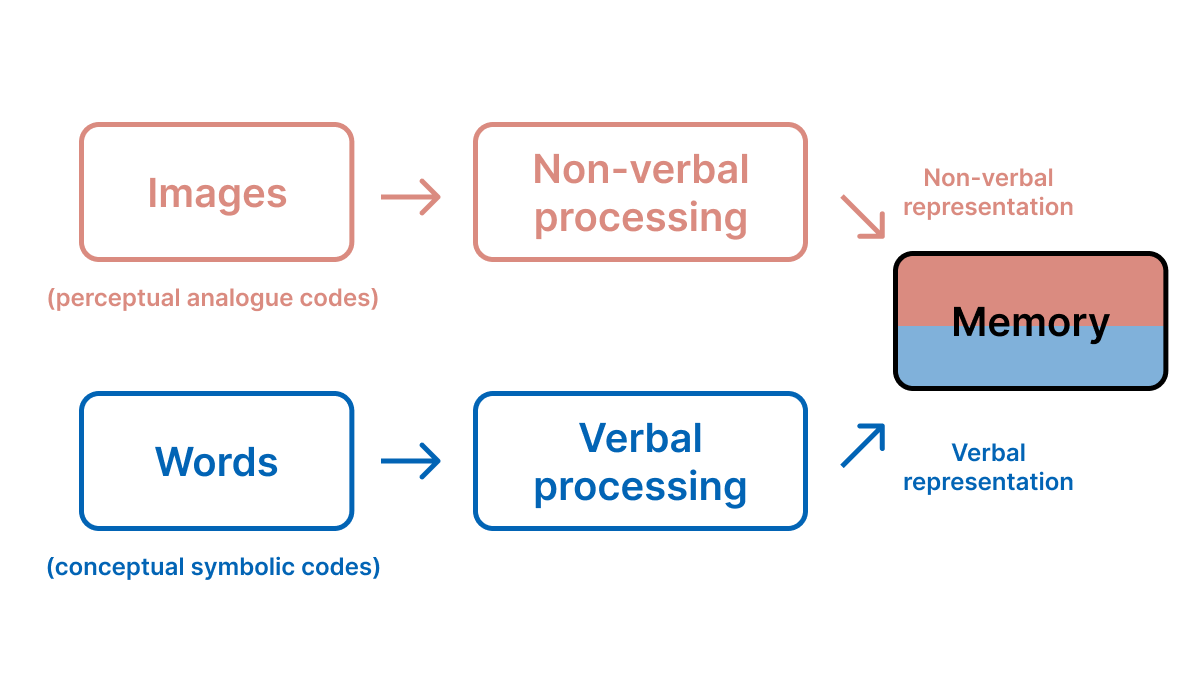Weekly I/O: Why image helps us remember, Goals are not strategies, Train our brain like machine learning model
#82: Dual-coding theory, Goals are not Strategies, Train Brain like ML, Main Thing, What we Pretend
Hi friends,
Greetings from San Francisco!
Here's your weekly dose of I/O. I hope you enjoy it!
Output
Here's what I've published since the last time we met.
1. Why I Write
A manifesto as a guideline for my future writing — on how to write, what to write, and why I should keep writing.
2. Useful Personal Rules
Some personal rules that have been helpful to me and some interesting rules from others that I've collected.
Input
Here's a list of what I'm exploring and pondering on this week.
1. Dual-coding theory: Verbal and nonverbal information are stored separately in our memory, and simultaneously processing both verbal and nonverbal representations of an idea helps us remember better.
Article: Mental Imagery
Proposed by psychologist (and bodybuilder) Allan Paivio, the dual-coding theory of memory explains why processing both verbal and nonverbal representations of information at the same time helps us remember the information better.
According to dual-coding theory, our mind creates different representations for conceptual symbolic codes (like numbers and words) and perceptual analogue codes (like physical stimuli and images) and stores them separately in our memory. For instance, we can remember the concept "turtle" as both the word "turtle" and the image of a "turtle."
Both verbal and nonverbal representations can be used to recall information. Therefore, when we try to recall information, we can retrieve either the word or the image individually, or both simultaneously. This ability to code information in two different ways increases our chance of remembering it.
Images are generally remembered better than verbal information. This is also related to picture superiority effect, which is often used as a learning aid. However, when sequential order is required, verbal information is recalled better.
If you're interested in learning more about the dual-coding theory, you can read Conceptual Issues in Dual Coding Theory for its incompatibility with the computational approach to the mind (computationalism), and Dual Coding and Common Coding Theories of Memory for an alternative theory.
2. Setting goals is not a strategy. Focus on vision, mission, and values without identifying the key challenge and designing a coherent plan to overcome it is not enough.
Book: Good Strategy Bad Strategy
Many companies assume that stating a list of objectives and key results (OKRs) and having a vision and mission statement is equivalent to having a strategy. However, strategy is not just about setting goals. It's about identifying specific challenges or obstacles that need to be conquered and then creating a plan of action to achieve the desired outcome.
Good strategy requires three key elements: a diagnosis of the critical challenge, a guiding policy for overcoming it, and a set of coherent actions to carry out that policy. Statements of desire like "we will grow our sales 20% this year" or "we must put our customers first" alone do not identify the concrete path forward.
I take this as a personal reflection as well. While I set personal OKRs every quarter and year, it's also important to document my strategies and thought processes for achieving those goals.
And lastly, I believe the key to developing exceptional strategies at both individual and company levels is gaining insights distilled from transformed knowledge.
3. Absorbing information for our brain is like training our machine learning model of the world. Even if we forget what we've learned, the data still trains our brains and model weights to make decisions.
Podcast: Andy Matuschak - Self-Teaching, Spaced Repetition, & Why Books Don’t Work | Dwarkesh Podcast
Machine learning models oftentimes work like black boxes. During the training process, the model learns from the provided data and extracts weights representing patterns and relationships within that data. These weights enable the model to make predictions or decisions without requiring it to remember the specific examples it was trained on.
Absorbing information for our brain is similar to training our model of the world. Our brain operates like a black box. Therefore, we might know how to do something without remembering why we know it. Even if we forget what we've learned, it still trains our brains and becomes weights (through spread activation).
Also from How You Know: "Reading and experience train your model of the world. And even if you forget the experience or what you read, its effect on your model of the world persists. Your mind is like a compiled program you've lost the source of. It works, but you don't know why."
4. The main thing is to keep the main thing the main thing. — Stephen Covey
Quote
I first learned this quote from Sarah Elizabeth Lewis in Tribe of Mentors.
Recently, Mark Zuckerberg quoted this when asked on the Dwarkesh Podcast whether he could have made it work if he were assigned CEO of Google+.
He believes Facebook can take off because they always prioritize it as their top priority, while Google+ is just a division within a company. The organization's capacity is largely limited by what they can focus on, and Facebook was their only focus. At both individual and organizational levels, the most important thing is focus.
5. We are what we pretend to be, so we must be careful about what we pretend to be.
Book: Mother Night
Love this quote from Kurt Vonnegut in Mother Night.
That's it. Thanks for reading. Please share which input you found the most helpful or intriguing. Just reply to this email with a number—it's quick and easy!
And as always, feel free to send me any interesting ideas you came across recently!
Looking forward to learning from you.
Cheers,
Cheng-Wei
Subscribe to Cheng-Wei’s Update | Subscribe to 程維的中文更新 | Subscribe to Weekly I/O | Facebook | Twitter



